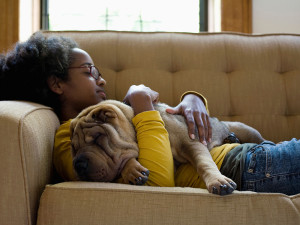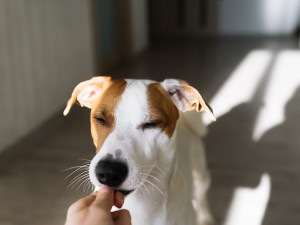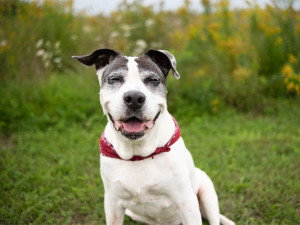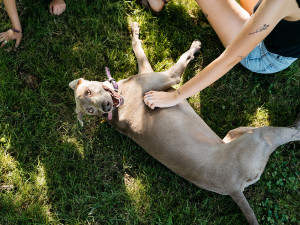Are CBD Products Safe for Your Dog?
Learn what’s best for your pup.

Share Article
In This Article:
Are CBD Products Safe for Your Dog?opens in a new tab What Are the Risks Associated with CBD Products?opens in a new tab Understanding Different Types of CBDopens in a new tab Types of CBD Productsopens in a new tab Find a Reputable Retaileropens in a new tab Look for Third-Party Testingopens in a new tab Do Your Researchopens in a new tab
Cannabis-derived (CBD) products are gaining popularity as potential treatments and supplements for dogs, sparking interest among pet parents. However, it’s important to consider the legal and safety aspects of these products for pets. Research on CBD’s benefits for dogs is promising, but these products lack FDA approval and oversight, meaning quality varies widely among products on the market. Consulting your veterinarian about CBD products is recommended before considering them for your dog.
Main takeaways
CBD is considered generally safe for dogs, but more research is needed to determine the health benefits.
Speak to your veterinarian if you’re considering giving your dog CBD.
Possible side effects of CBD in dogs include GI upset, drug interactions, liver changes, unsafe ingredients, and THC toxicity.
Look for reputable products that have a Certificate of Analysis (CoA) — the result of third party testing that provides information on a product’s ingredients and potential contaminants.

littleKin™ is Kinship’s home just for puppy and kitten parents. Bop over to check out expert advice, new pet tools, and special deals—all curated for your newest family member.
opens in a new tabAre CBD products safe for your dog?
With the recent loosening of laws regarding cannabis, many dog parents are left wondering, is CBD safe for dogs? Yes, CBD is generally safe for dogs.
Cannabidiol (CBD) is an oil extracted from Cannabis spp. plants. Cannabis plants contain two well-known chemical compounds: Tetrahydrocannabinol (THC) and cannabidiol (CBD). THC is psychoactive, meaning it can alter awareness and behavior, or in other words, can make people ”high.” CBD, on the other hand, is not psychoactive and does not have any mind altering effects.
People use CBD oil to help manage chronic pain, arthritis, seizures, and side effects associated with cancer treatments. Dogs have been given CBD oil to help manage many of the same conditions. Multiple studies have suggested that CBD can reduce pain associated with osteoarthritis in dogsopens in a new tab. CBD may also reduce itchinessopens in a new tab in dogs with skin disease. It may also reduce seizure frequencyopens in a new tab and undesired behaviors like anxiety and aggression.
CBD oil is considered safe for dogs, though some dogs do experience side effects, including mild gastrointestinal upset and lethargy. Known side effects are based on observing the impact of short term use. The effects of long-term use of CBD in dogs has yet to be determined.
What are the risks associated with CBD products?
It’s important to know the potential risks associated with giving your dog CBD and the importance of finding reputable products.
Side effects
The most common side effect of CBD in dogs is gastrointestinal upset, including nausea, vomiting, drooling, and diarrhea. Some dogs may also develop lethargy or an unsteady gait. Skin redness and irritation have been seen in some dogs after application of topical CBD cream or administration of high doses of CBD orally.
Unsafe ingredients
Many oral CBD products are flavored and sweetened to improve palatability. Some products are sweetened with xylitolopens in a new tab, an artificial sweetener that is toxic to dogs. This is part of why it’s important to read product labels carefully and choose products that have undergone independent testing.
Drug interactions
CBD inhibits cytochrome P450, an enzyme that is important for metabolizing drugs. If your dog has been prescribed medication to manage any health issue, like seizures or anxiety, speak to your veterinarian before starting CBD. They may recommend dose adjustments.
Possible liver changes
Long-term or high-dose use of CBD in dogs has been associated with elevated levels of alkaline phosphatase, a liver enzyme. These changes appear to resolve after CBD is discontinued, but the long-term implications are still unclear.
Understand different types of CBD
Not all CBD products are the same. There are three main types of CBD: full-spectrum, broad-spectrum, and isolates. Here what to know about each type:
Full-spectrum CBD
Full spectrum CBD contains all elements of Cannabis, including terpenes, flavonoids, and cannabinoids. Terpenes are what give cannabis plants their taste and smell. Flavonoids provide the plants’ color as well as antioxidant qualities. Full spectrum CBD also contains cannabinoids, including THC, though they will only contain 0.3 percent or less. Although the THC content of full-spectrum CBD is low, a dog that ingests large quantities can still develop signs of mild THC toxicityopens in a new tab.
Because full-spectrum CBD contains all components of a cannabis plant, it is more likely to have an “entourage effect.” The entourage effect is a process in which the different components of a plant are better absorbed and more effective when consumed together compared to individually.
Broad-spectrum CBD
Broad-spectrum CBD contains all of the components of the cannabis plant, except it will only contain trace amounts of THC or no THC at all. Broad-spectrum THC may be preferred by people who don’t want THC, but are still seeking the benefits of other cannabinoids, like cannabinol (CBN) and cannabigerol (CBG).
CBN has shown potential as a sleep aid and may provide some pain relief, while CBG has anti-inflammatory properties. More research is needed on both cannabinoids to know their true efficacy and whether these benefits apply to dogs.
CBD isolate
CBD isolates only contain CBD and none of the other components of the cannabis plant. CBD isolates, however, may still contain trace amounts of THC. CBD isolates may have less potent effects because of the lack of entourage effect.
Types of CBD products
Be advised that CBD products are not regulated by the Food and Drug Administration (FDA) and do not have to undergo the same testing as FDA-approved drugs. This means that CBD products for dogs have not undergone the FDA’s standardized testing to confirm safety, efficacy, and label accuracy.
CBD products for dogs
CBD products for dogs come in many forms, and most are meant to be given orally. If you’re considering CBD for your dog, it’s best to stick with dog-specific products unless your vet recommends otherwise. This helps to avoid potentially toxic ingredients like xylitol. Common types of CBD products for dogs include:
CBD dog treats
CBD soft chews
CBD capsules for dogs
CBD-infused salves for dogs
Find a reputable retailer
Where you live will impact what types of CBD products you have access to and where you’re able to purchase them. It’s important to do some due diligence before purchasing CBD for your pup.
Understand federal and state legality
The difference in legality on a federal level and among states often leaves cannabis products in a legal gray area. Federally, cannabis is labeled as a Schedule I drug, meaning it is considered to have a high potential for dependency. Despite this classification, some states allow cannabis to be sold for medical or recreational purposes (with restrictions).
Where can you buy CBD for your dog?
Inconsistent regulations can leave some veterinarians unable or hesitant to dispense or even recommend CBD for their patients. And with no FDA oversight, product safety and label accuracy can not be assured, potentially putting their patients at risk. However, some vets have products that they trust and have seen positive results with.
CBD may or may not be on your local veterinary clinic’s shelves, but it’s a good idea to check there first. Here are some places to consider if you're looking for where to buy CBD for dogs:
Veterinarians
Pet pharmacies
Dispensaries
Pet stores
Direct from product manufacturers
Look for third-party testing
When choosing a CBD product for your dog, read CBD for dogsopens in a new tab reviews and only consider products that have Certificate of Analysis (CoA). A CoA is a report of the results of testing performed by a third-party laboratory. Checking for a CoA is a good way to determine if a CBD product has undergone some sort of quality control.
A Certificate of Analysis will provide information on the amount of each cannabinoid present in the product. It will also provide information on potential contaminants, including heavy metals, pesticides, molds, and microbacteria.
Do your research
When exploring CBD options for your dog, take time to perform research to try to find the safest and most effective options. While studies have shown promising results regarding how CBD can benefit dogs, more research is needed. CBD can serve as a supplement, but it should not replace veterinary-prescribed medications for medical conditions. Here are some steps and categories to guide your search:
Products recommended by your veterinarian
Start by speaking with your veterinarian for recommendations on trusted brands or products tailored to your dog’s needs. Remember that your vet may recommend against CBD if there are concerns about medication interactions.
Third-party lab testing
Only consider products that have undergone third-party laboratory testing and have a Certificate of Analysis. Use reviews to find the best third-party tested CBD oil or treats.
Product transparency
Reputable companies should be transparent about their products’ testing, sourcing, and processing, and ingredient list. The product label should also have clear information on the product as well as who to contact if there are questions or concerns. Choose products with labels that include information like production date, expiration date, batch/lot number, storage information, inactive ingredients, and manufacturer’s location. If you have to guess what’s in a product — move on.
CBD products for specific needs
Consider your dog’s specific requirements to find targeted products, such as CBD for dogs with anxietyopens in a new tab or arthritis.
Final thoughts: Are CBD products safe for your dog?
When searching for safe CBD products for dogs, consult your veterinarian first. Look for third-party lab tested options with a Certificates of Analysis, focusing on organic CBD specifically formulated for canines. Choose reputable brands that provide transparent sourcing, avoid products with THC, and check for minimal artificial additives.
References
Alessandra Di Salvo, et al. Pharmacokinetics, Efficacy, and Safety of Cannabidiol in Dogs: An Update of Current Knowledge. Vol. 10, 30 June 2023, www.ncbi.nlm.nih.gov/pmc/articles/PMC10347378/opens in a new tab, https://doi.org/10.3389/fvets.2023.1204526opens in a new tab.
“FAQs about CBD Use in Pets.” ASPCApro, 11 Apr. 2018, www.aspcapro.org/resource/faqs-about-cbd-use-petsopens in a new tab.
Pahr, Kristi. “Beginner’s Guide to CBD.” Healthline, Healthline Media, 3 Aug. 2018, www.healthline.com/health/your-cbd-guideopens in a new tab.
Timmons, Jessica. “The Different Types of CBD.” Healthline, 2020, www.healthline.com/cbd/types-of-cbdopens in a new tab. Accessed 27 Dec. 2024.
“CBD Isolate vs. Full-Spectrum CBD: Differences and Benefits.” www.medicalnewstoday.com, 25 Sept. 2020, www.medicalnewstoday.com/articles/cbd-isolate-vs-full-spectrum-cbdopens in a new tab.
“Beyond CBD: Here Come the Other Cannabinoids, but Where’s the Evidence?” Harvard Health, 23 Mar. 2021, www.health.harvard.edu/blog/beyond-cbd-here-come-the-other-cannabinoids-but-wheres-the-evidence-2021032322190opens in a new tab.

Dr. Alycia Washington, DVM, MS
Alycia Washington, DVM, is a small animal emergency veterinarian based in North Carolina. She works as a relief veterinarianopens in a new tab and provides services to numerous emergency and specialty hospitals. Dr. Washington is also a children’s book author and freelance writer with a focus on veterinary medicine. She has a special fondness for turtles, honey bees, and penguins — none of which she treats. In her free time, Dr. Washington enjoys travel, good food, and good enough coffee.
Related articles
- opens in a new tab
CBD Oil for Dogs: Is the Green Stuff Good for Your Pup
There are options everywhere. Here’s how to sift through them — and how it could help your dog.
![Hand giving a treat to a blissful and calm looking dog]() opens in a new tab
opens in a new tabDoes Your Pet Want in On Your CBD?
6 of the best pet CBD products on the market — if it’s the right choice for your pet.
![Young woman sitting in a chair holding and petting a small black Dachshund in her lap.]() opens in a new tab
opens in a new tabHow a Little of the Good Stuff (CBD) Can Help Your Dog With Seizures
Here’s the info you need before you buy.
![senior dog with arthritis happily sitting on the grass]() opens in a new tab
opens in a new tabCan CBD Oil Help Relieve Pain for Dogs With Arthritis?
Take a close look at the role CBD oil may play in a veterinarian-approved treatment plan for osteoarthritis.
![Happy and calm dog laying on her back on the bed]() opens in a new tab
opens in a new tabHow CBD Oil May Help Dogs With Cancer
It’s not a cure — but it may slow cancer growth and ease your dog’s aches and pains.
![Girls Playing With Their Dog At The Park]() opens in a new tab
opens in a new tabResearch Confirms CBD Is a Safe Way to Get Your Dog to Chill Out
New research finds the hemp derivative can help your dog with car and separation anxiety.







